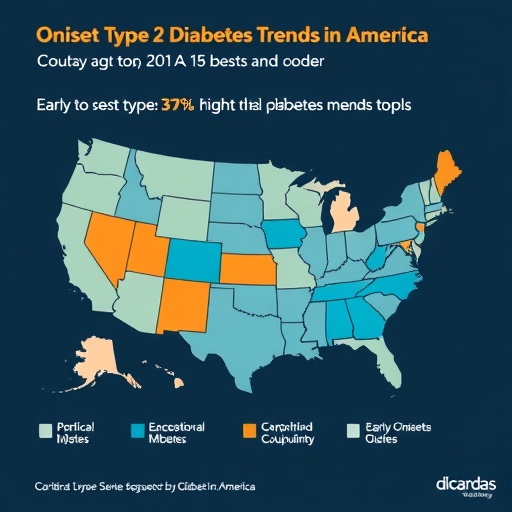Recent research has unveiled concerning trends related to early onset Type 2 diabetes in the United States, a chronic condition traditionally associated with older populations. The findings illustrate that this condition is increasingly afflicting younger individuals, raising alarms within the medical community and prompting discussions about underlying causes and prevention strategies. Notably, this analysis draws on data from the National Health and Nutrition Examination Survey (NHANES) spanning two decades, from 1999 to 2020, to delineate the demographic and clinical characteristics of those affected.
The passage of time in the NHANES data gauges fluctuations in early onset Type 2 diabetes prevalence, which appears not only to increase in frequency but also in the diversity of those impacted. The research indicates that various demographic factors, such as ethnicity, socio-economic status, and lifestyle choices, profoundly influence susceptibility to this condition. This study sheds light on the potential disparities in health outcomes and access to care faced by different demographic groups suffering from this chronic disease.
Examining the demographic characteristics elicits a deeper understanding of who is most prone to early onset Type 2 diabetes. Findings suggest that certain groups, notably Hispanic and Black populations, demonstrate disproportionately higher rates of the disease. These results underscore the critical need for culturally sensitive public health interventions designed to address these disparities. Both higher prevalence and severity of diabetes-related complications within these populations call for urgent measures to combat this trend.
The clinical features associated with early onset Type 2 diabetes also deserve scrutiny. Data reveals that individuals diagnosed at a young age often exhibit more aggressive disease manifestations. Factors such as body mass index (BMI), insulin resistance, and a family history of diabetes play pivotal roles in determining not just the onset of the disease but also its progression. Younger patients frequently grapple with a range of comorbidities, including hypertension and dyslipidemia, highlighting the multifaceted challenges faced by this population.
One of the pivotal aspects of this NHANES analysis is the identification of lifestyle factors contributing to the rise of early onset Type 2 diabetes. Sedentary behavior, unhealthy dietary patterns, and obesity are now being recognized as significant precursors to the disease. The research indicates an alarming trend of declining physical activity levels among youth, alongside the rising consumption of calorie-dense, nutrient-poor foods. These lifestyle choices underline the urgency for educational campaigns advocating for healthier habits among younger populations.
Mental health implications associated with early onset Type 2 diabetes cannot be disregarded. Individuals facing this diagnosis at a young age frequently experience psychological distress, which exacerbates the challenges of managing their condition. Depression and anxiety disorders are notably prevalent among these patients, raising questions about the intersection between mental health and chronic disease management. Addressing mental health alongside physical health emerges as a critical component of comprehensive care for these patients.
The implications of early onset Type 2 diabetes extend beyond individual health. The rising prevalence foretells an impending public health crisis, as more young people will require long-term management of a condition that can significantly diminish quality of life. As prevalence trends continue upward, healthcare systems may face unprecedented challenges in providing adequate resources and care for this demographic. This future burden emphasizes the necessity for preventative strategies aimed at curbing the tide of this concerning health trend.
Public health interventions must be dynamically tailored to meet the needs of at-risk populations. Strategies focusing on comprehensive educational programs, robust community engagement, and accessibility to health resources can play a crucial role in prevention efforts. Emphasizing preventative care, including regular screening for high-risk demographic groups, could help detect early signs of diabetes and prevent its onset.
Collaborative efforts across various sectors, including healthcare providers, schools, and community organizations, will be essential for combating the rising tide of early onset Type 2 diabetes. Such collaboration may lead to the development of innovative programs that promote physical activity, healthy eating, and mental health awareness. Harnessing the collective expertise of multiple stakeholders increases the potential for impactful interventions that resonate with the target population.
The significance of this NHANES study cannot simply be measured in prevalence statistics. The research serves as a clarion call, beckoning society to respond to an emerging healthcare crisis while highlighting the need for ongoing research into the biology of Type 2 diabetes and the long-term consequences of early onset. Finding effective preventative strategies will depend upon further amplifying the voices of those directly affected while educating the broader community about the risks associated with early onset Type 2 diabetes.
As the healthcare landscape adapts to this emerging epidemic, a renewed emphasis on patient-centered care may pave the way for better outcomes. Empowering patients, particularly those diagnosed at a young age, with knowledge and resources to manage their health can foster a sense of agency. Furthermore, investing in mental health resources can significantly improve life satisfaction and health outcomes for those living with diabetes.
In conclusion, the rise of early onset Type 2 diabetes presents an urgent public health challenge, requiring multi-faceted approaches to understand and mitigate its effects. This NHANES analysis serves as an important foundation for future research, advocacy, and intervention strategies aimed at addressing this growing concern. As the conversation around diabetes evolves, it is crucial for society to prioritize preventative health measures, empowering individuals and communities to combat the rising threat posed by this chronic condition.
Subject of Research: Early onset Type 2 diabetes prevalence and characteristics
Article Title: Prevalence, Demographic and Clinical Characteristics of Individuals with Early Onset Type 2 Diabetes in the USA: an NHANES Analysis 1999–2020
Article References:
Lee, C.J., Bergman, B.K., Gou, R. et al. Prevalence, Demographic and Clinical Characteristics of Individuals with Early Onset Type 2 Diabetes in the USA: an NHANES Analysis 1999–2020. Diabetes Ther (2025). https://doi.org/10.1007/s13300-025-01788-7
Image Credits: AI Generated
DOI:
Keywords: Early onset diabetes, NHANES, public health, demographics, lifestyle factors, prevention, comorbidities, mental health, healthcare systems




